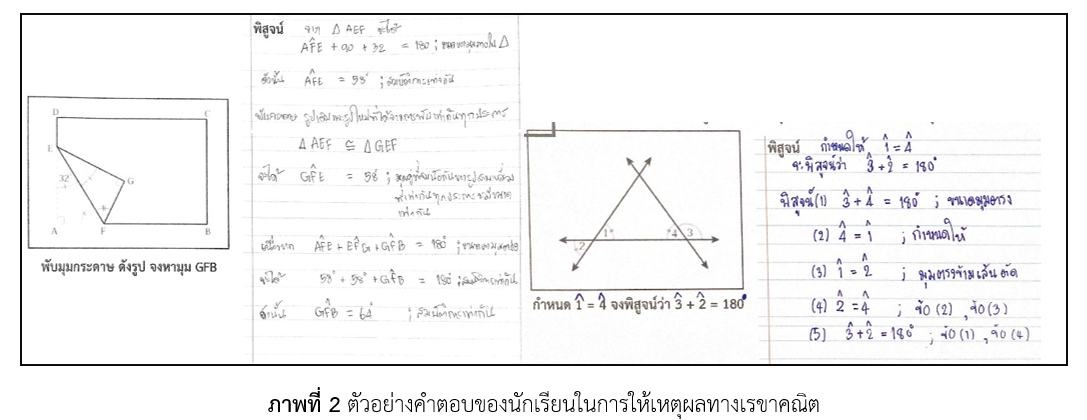ผลการจัดกิจกรรมการเรียนรู้แบบสืบเสาะหาความรู้ร่วมกับบทเรียนผ่าน GeoGebra ที่มีต่อการคิดเชิงเรขาคณิตและผลสัมฤทธิ์ทางการเรียนของนักเรียนชั้นมัธยมศึกษาปีที่ 2
Main Article Content
บทคัดย่อ
การวิจัยในครั้งนี้มีวัตถุประสงค์เพื่อ 1) ศึกษาการคิดเชิงเรขาคณิตของนักเรียนชั้นมัธยมศึกษาปีที่ 2 ที่ได้รับการจัดการเรียนรู้แบบสืบเสาะหาความรู้ร่วมกับบทเรียนผ่าน GeoGebra 2) เปรียบเทียบผลสัมฤทธิ์ทางการเรียน เรื่อง การให้เหตุผลทางเรขาคณิต ของนักเรียนชั้นมัธยมศึกษาปีที่ 2 หลังได้รับการจัดการเรียนรู้แบบสืบเสาะหาความรู้ร่วมกับบทเรียนผ่าน GeoGebra กับเกณฑ์ร้อยละ 70 และ 3) ศึกษาความพึงพอใจของนักเรียนหลังการจัดการเรียนรู้ กลุ่มเป้าหมายที่ใช้ในการวิจัย คือ นักเรียนชั้นมัธยมศึกษาปีที่ 2 โรงเรียนแห่งหนึ่งในจังหวัดกาฬสินธุ์ จำนวน 20 คน ที่ได้มาจากการเลือกแบบเจาะจง เครื่องมือที่ใช้ในการวิจัย ประกอบด้วย แผนการจัดการเรียนรู้ แบบทดสอบวัดการคิดเชิงเรขาคณิต แบบวัดผลสัมฤทธิ์ทางการเรียน และแบบสอบถามความพึงพอใจ วิเคราะห์ข้อมูลโดยใช้สถิติพื้นฐานและการวิเคราะห์เชิงเนื้อหา ผลการวิจัย พบว่า 1) การคิดเชิงเรขาคณิตของนักเรียนชั้นมัธยมศึกษาปีที่ 2 ที่ได้รับการจัดการเรียนรู้แบบสืบเสาะหาความรู้ร่วมกับบทเรียนผ่าน GeoGebra พบว่า นักเรียนมีการคิดเชิงเรขาคณิตของนักเรียนชั้นมัธยมศึกษาปีที่ 2 หลังเรียน สูงกว่าร้อยละ 60 2) นักเรียนมีคะแนนผลสัมฤทธิ์ทางการเรียนคณิตศาสตร์ เรื่อง การให้เหตุผลทางเรขาคณิต หลังเรียนสูงกว่าเกณฑ์ที่ตั้งไว้ร้อยละ 70 อย่างมีนัยสำคัญทางสถิติที่ระดับ .05 3) ความพึงพอใจของนักเรียน ในภาพรวมอยู่ในระดับมาก ( = 4.45, S.D. = 0.36)
คำสำคัญ: การคิดเชิงเรขาคณิต การจัดการเรียนรู้แบบสืบเสาะหาความรู้ บทเรียนผ่าน GeoGebra
Article Details

อนุญาตภายใต้เงื่อนไข Creative Commons Attribution-NonCommercial-NoDerivatives 4.0 International License.
วารสารวิทยาศาสตร์และวิทยาศาสตร์ศึกษา (JSSE) เป็นผู้ถือลิสิทธิ์บทความทุกบทความที่เผยแพร่ใน JSSE นี้ ทั้งนี้ ผู้เขียนจะต้องส่งแบบโอนลิขสิทธิ์บทความฉบับที่มีรายมือชื่อของผู้เขียนหลักหรือผู้ที่ได้รับมอบอำนาจแทนผู้เขียนทุกนให้กับ JSSE ก่อนที่บทความจะมีการเผยแพร่ผ่านเว็บไซต์ของวารสาร
แบบโอนลิขสิทธิ์บทความ (Copyright Transfer Form)
ทางวารสาร JSSE ได้กำหนดให้มีการกรอกแบบโอนลิขสิทธิ์บทความให้ครบถ้วนและส่งมายังกองบรรณาธิการในข้อมูลเสริม (supplementary data) พร้อมกับนิพนธ์ต้นฉบับ (manuscript) ที่ส่งมาขอรับการตีพิมพ์ ทั้งนี้ ผู้เขียนหลัก (corresponding authors) หรือผู้รับมอบอำนาจ (ในฐานะตัวแทนของผู้เขียนทุกคน) สามารถดำเนินการโอนลิขสิทธิ์บทความแทนผู้เขียนทั้งหมดได้ ซึ่งสามารถอัพโหลดไฟล์บทความต้นฉบับ (Manuscript) และไฟล์แบบโอนลิขสิทธิ์บทความ (Copyright Transfer Form) ในเมนู “Upload Submission” ดังนี้
1. อัพโหลดไฟล์บทความต้นฉบับ (Manuscript) ในเมนูย่อย Article Component > Article Text
2. อัพโหลดไฟล์แบบโอนลิขสิทธิ์บทความ (Copyright Transfer Form) ในเมนูย่อย Article Component > Other
ดาวน์โหลด ไฟล์แบบโอนลิขสิทธิ์บทความ (Copyright Transfer Form)
เอกสารอ้างอิง
Assuah, C. K., Osei, L. and Mantey, G. K. (2022). The Effect of Inquiry-based Learning on Senior High School Students’ Achievement in Plane Geometry: Pre-test-Post-test Randomized Experimental Design. Asian Research Journal of Mathematics, 18(11), 320-331.
Atoyebi, S. B. and Atoyebi, O. M. (2022). The link between mathematics teaching strategies and students' anxiety. Asian Journal of Education and Social Studies, 33(4), 48-57.
Charnprasert, S. (2014). Active learning: Learning management in the 21stcentury. IPST magazine, 42(188), 3-6.
Evans, T. and Dietrich, H. (2022). Inquiry-based mathematics education: a call for reform in tertiary education seems unjustified. arXiv preprint arXiv, 2(3), 221-244
Hancherngchai, S., Inprasitha, M. and Thinwiangthong, S. (2017). Mathematics Teacher Education Program for 21st Century. HRD JOURNAL, 8(1), 55-66.
Hohenwarter, M. and Fuchs, K. (2004). Combination of dynamic geometry, algebra and calculus in the software system GeoGebra. In Computer algebra systems and dynamic geometry systems in mathematics teaching conference, 1-6.
Jerrim, J., Oliver, M. and Sims, S. (2022). The relationship between inquiry-based teaching and students’ achievement. New evidence from a longitudinal PISA study in England. Learning and Instruction, 80, 101310.
Kanachan, J., Kaewkhamson, K., Nongharnpituk, P. and Khansila, P. (2020). A study of learning achievement in the applications of derivative topic for Grade-12 students taught by incorporating GeoGebra program into mathematics problem-solving based on Polya's method (in Thai). Journal of Science and Science Education, 3(1), 73-83.
Khansila, P., Yonwilad, W., Nongharnpituk, P. and Thienyutthakul, S. (2022). Improving Academic Performance in Geometry Using a Mastery Learning Approach through GeoGebra. Journal of Educational Issues, 8(2), 876-894.
Korkmaz, H. I. and Yilmaz, A. (2022). Inquiry-based mathematics activities to improve children’s geometric and spatial thinking skills. Turkish Journal of Education, 11(3), 143-161.
Murphy, C., Abu-Tineh, A., Calder, N. and Mansour, N. (2021). Teachers and students’ views prior to introducing inquiry-based learning in Qatari science and mathematics classrooms. Teaching and teacher education, 104, 103367.
Mensah-Wonkyi, T. and Adu, E. (2016). Effect of the inquiry-based teaching approach on students’ understanding of circle theorems in plane geometry. African Journal of Educational Studies in Mathematics and Sciences, 12(1), 61-74.
Ministry of Education. (2017). Indicators and Core Content Mathematics Department (Revised Version B.E. 2560, A.D.2017) The Basic Education Care Curriculum B.E. 2551 (A.D. 2008). (in Thai). The Agricultural Cooperative Federation of Thailand Limited.
Phoodee, W. (2020). Mathematics instruction in digital age: Methods and tools (in Thai). Journal of Science and Science Education, 3(2), 190-199
Polya, G. (1957). How to solve it: A new aspect of mathematical method. Princeton N.J: Princeton University Press.
Schoenfeld, A. H. (1992). Learning to think mathematically: problem solving, metacognition, and sense making in mathematics, New York: Macmillan Publishing.
Siew, N. M., Chong, C. L. and Abdullah, M. R. (2013). Facilitating students' geometric thinking through van Hiele's phase-based learning using tangram. Journal of Social Sciences, 9(3), 101-111.
The Institute for the Promotion of Teaching Science and Technology. (2017). A guide to using the curriculum to learn mathematics (revised version B.E. 2560) according to the core curriculum for basic education, 2008. Retrieved 1 April 2020, from SciMath: https://www.scimath.org/ebook-mathematics/item/8380-2560-2551-8380.Thongma, T. (2018). Mathematics learning resources for mobile learning in digital age (in Thai). Journal of Educations studies, Chulalongkorn University, 46(1), 251-256.
U-ma, A. Mopan, N. Lateh, A. and Saree, O. (2017) Effect of 5Es Inquiry-based Learning of Chemical Equilibrium on Mental Models, Chemistry Achievement and Satisfaction of Grade 11 Students (in Thai). Journal of Education, Prince of Songkla University, Pattani Campus, 30(1), 181-194
Vojkuvkova, I. (2012). The van Hiele model of geometric thinking. WDS’12 Proceedings of Contributed Papers, 1, 72-75.
Worasarn, J., Nongharnpituk, P. and Khansila, P. (2019). Development of learning activities emphasizing mathematical processes using GeoGebra program on system of linear equations with two variables topic for grade-9 students (in Thai). Journal of Science and Science Education, 2(1), 34 -42.
Zafra-Gómez, J. L., Román-Martínez, I. and Gómez-Miranda, M. E. (2015). Measuring the impact of inquiry-based learning on outcomes and student satisfaction. Assessment & Evaluation in Higher Education, 40(8), 1050-1069.


